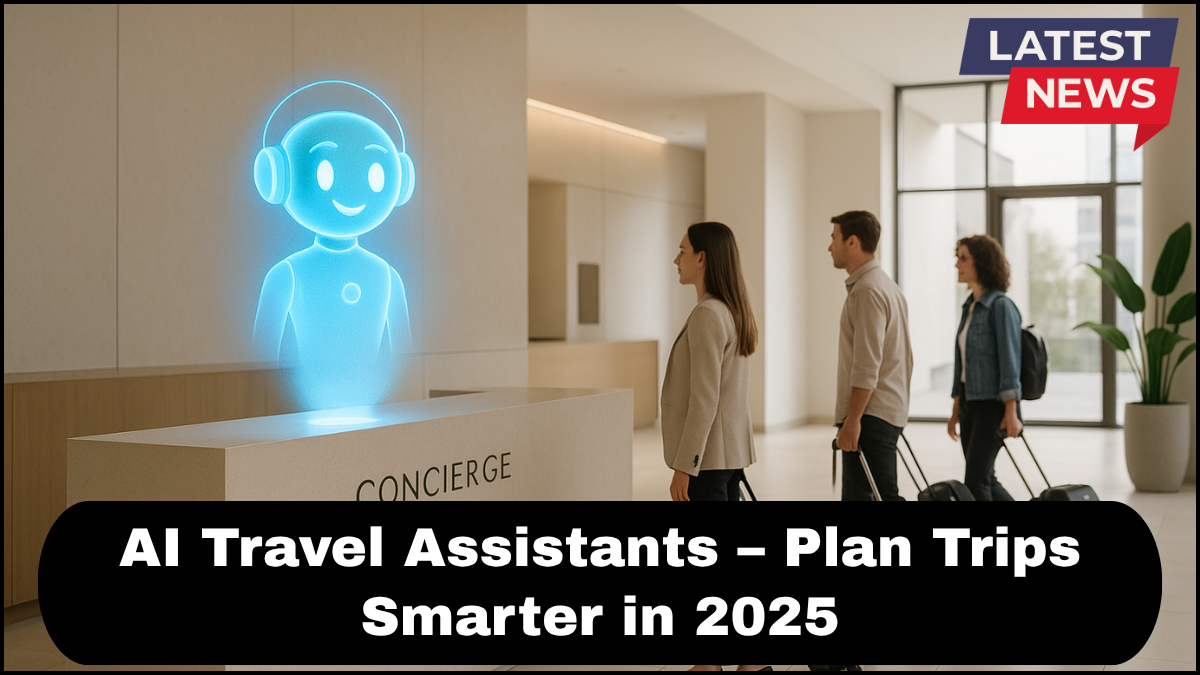In 2025, travel planning isn’t just easier—it’s smarter, faster, and more personalized than ever before. Thanks to AI Travel Assistants 2025, globetrotters, business travelers, and vacationers alike can now rely on intelligent systems to design flawless journeys, manage schedules, and solve travel hiccups in real time.
Artificial Intelligence has moved beyond simple booking apps. It now powers adaptive travel experiences, where smart itinerary tools understand your preferences, adjust to changes, and even predict your needs. Let’s break down how these AI-powered assistants are transforming the way we travel in 2025.

How AI Travel Assistants Work in 2025
Modern AI Travel Assistants 2025 aren’t just glorified chatbots—they’re integrated, intelligent ecosystems. Using machine learning, natural language processing, and real-time data feeds, they offer personalized travel guidance from start to finish.
These systems aggregate flight options, hotel availability, local experiences, and transportation modes, then generate a custom itinerary based on the user’s goals, budget, and style. Unlike traditional trip planners, AI assistants update instantly when conditions change—like flight delays or weather disruptions—keeping travelers a step ahead at all times.
Smart Itinerary Tools – Beyond Static Schedules
Smart itinerary tools in 2025 have redefined the concept of travel scheduling. Forget static PDFs or uneditable calendars. These dynamic planners:
-
Sync with your calendar, maps, and personal preferences.
-
Update automatically if flights are delayed, gates change, or bookings get canceled.
-
Suggest nearby activities, dining options, or local transport based on real-time conditions and your interests.
-
Translate languages and handle cultural nuances in recommendations.
-
Offer voice and text interactions for quick changes or requests.
For example, if you’re in Paris and a museum visit is canceled due to a strike, your AI assistant can suggest an art walk, book a local guide, and reserve a nearby café for lunch—all within seconds.
Hyper-Personalization in Travel Planning
One of the most powerful features of AI Travel Assistants 2025 is hyper-personalization. Using past travel history, social media cues, browsing behavior, and direct user input, these assistants curate unique experiences.
For a food enthusiast, this might mean a street food crawl in Bangkok. For a history buff, exclusive access to hidden historical tours in Rome. AI doesn’t just find things to do—it matches you with the right experiences at the right time, eliminating guesswork.
Sustainability and Cost Optimization
AI also helps travelers make smarter, more ethical choices. By analyzing eco-ratings of flights, hotel sustainability practices, and carbon footprint data, AI travel assistants empower users to prioritize green options.
Cost optimization is equally robust. These assistants can:
-
Predict the best time to book flights or hotels.
-
Alert users to price drops or limited-time offers.
-
Suggest off-peak travel windows for better deals.
Smart itinerary tools can also group activities and transport logically to save time and money—like suggesting walking tours in clustered locations or recommending day passes for public transit.
Real-Time Problem Solving and Safety
Travel can be unpredictable, but AI Travel Assistants 2025 turn chaos into calm. Whether it’s a missed connection, lost luggage, or sudden travel restrictions, AI tools can rebook tickets, file claims, or reroute itineraries within moments.
Some systems even use AI to assess real-time safety data and alert travelers to risky areas or sudden political unrest, ensuring peace of mind and informed decisions.
Future Trends: What’s Next for AI in Travel?
The next evolution of AI in travel may include:
-
Emotion-aware AI: Adjusting recommendations based on tone of voice or stress levels.
-
AR-integrated travel guides: Where AI overlays real-time info on your phone’s camera view.
-
AI companions for solo travelers: Digital guides that provide both logistical and conversational support.
These developments promise even deeper integration between AI and human travel behavior, further blurring the line between digital and personal assistance.
FAQs About AI Travel Assistants 2025
Q1: Are AI travel assistants better than human agents?
A: For standard travel planning, AI assistants are faster and often more accurate. They excel at personalization and real-time updates. However, complex or emotionally nuanced trips may still benefit from a human touch.
Q2: Are smart itinerary tools safe to use?
A: Yes. Most tools come with encrypted data systems and comply with international data protection laws. Users should still verify app permissions and use reputable services.
Q3: Can AI travel assistants work offline?
A: Many can store key itinerary details offline, but full functionality like real-time updates and booking changes requires internet access.
Q4: How much do AI travel assistants cost?
A: Many AI-based travel apps offer free basic features. Premium services with deeper personalization, travel concierge options, and exclusive offers may require a subscription.
Q5: Will AI replace travel apps entirely?
A: AI will likely integrate into all travel platforms rather than replace them. Expect most apps and websites to embed AI features by default in the coming years.
click here to learn more